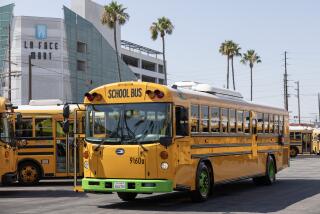Structures May Give Day Care Room to Grow : Schools: Ventura Unified’s after-school programs could have space for 700 students instead of 400 if prefabricated buildings are bought.
- Share via
Spaces in the Ventura Unified School District’s day-care programs could nearly double if private day-care contractors succeed in their plan to install prefabricated classrooms at 13 schools, a district official said Tuesday.
Day-care contractors Tuesday hailed a Ventura City Council decision Monday to co-sign up to $1.5 million in loans for contractors to buy 10 such prefabricated buildings to add to the three buildings already promised by the state Department of Education.
If all 13 buildings are installed, the district’s day-care capacity could increase from 400 to 700 students and shorten the existing programs’ waiting lists, which are up to six months long and sometimes twice the size of the individual classes.
The prefabricated day-care centers also will allow the district, which has 17 elementary schools, to begin reclaiming the classrooms and cafeterias it has been leasing to the five private day-care contractors, said Michael Sellwood, the district’s director of administrative services.
But there will be a wait.
Nothing can happen until the loans are approved, the building permits are obtained and the buildings are completed at the factories, which could take at least six to nine months, said Gary Mortimer, the district’s director of facilities.
Until that time, day-care officials said, the children will continue to spend their afternoons in makeshift spaces such as the Montalvo School cafeteria, where Valerie Crawford runs a day-care program for the YMCA.
On Tuesday afternoon, the giggles of the more than 20 children Crawford cares for echoed in the spacious cafeteria.
The first- to fifth-graders had left their book bags in a line on the floor and begun making plaster-of-Paris handprints under Crawford’s supervision.
The children tend to get rowdier in the big, rented room where they stay from the school’s final bell until their parents pick them up, as late as 6:30 p.m., Crawford said. And Crawford said she is getting tired of using a filing cabinet in the adjoining closet for her desk.
A proper day-care classroom would include a reading corner, room for games and cubbyholes for the children’s belongings, said Woody Cox, executive director of the Ventura YMCA.
In fact, a prefabricated building meant to house the Montalvo School’s day-care program has sat unused on the playing field since December, when the state provided it under a program separate from the contractors’ building plan.
But it can’t be used until it has stairs and a wheelchair ramp, which have been on order with the manufacturer for several months, Mortimer said.
Meanwhile, after-school noise from the children in the cafeteria has driven Montalvo School’s staff meetings from an adjoining room to a quieter but cramped teachers’ lounge, Principal Marie Atmore said. “But it’s after school. These kids should be able to make a little noise,” Atmore said Tuesday.
However, “Space at a school like this is at a premium,” she said. “The PTA wants that closet for storage for its meetings.”
Sellwood agreed that the schools need the space, saying, “It’s far more advantageous to us to have access to our cafeterias. Our school population is growing.”
Sellwood said the district soon must reclaim classroom space used during the day by the contractors, which include the YMCA, Child Development Inc., Gold Coast Child Development Centers, Las Posas Children’s Center and Campfire Inc. Child Development Center.
The backlog of orders at the prefab factories continues to grow as California’s increasing population leads schools to order more temporary classrooms, he said.
In the meantime, the day-care contractors must settle for makeshift quarters, said Vernon Plaskett, director of Child Development Inc.
“It’s a compromise,” Plaskett said Tuesday. “The whole idea of us getting the financing is having the children in their own classrooms, getting a good environment for them that’s designed for the after-school programs and not interfering with the schools.”
But Cox said the contractors found the first bids for prefabricated classrooms were too expensive at about $70,000 apiece and that this forced them to re-examine their financing plans. He added that the YMCA is reluctant to raise the rates it charges for day care, which are similar to those charged by other in-school contractors and vary according to parents’ ability to pay.
Unless they can solicit lower bids, the contractors may have to cut back their day-care services to afford the buildings or give up on the plan altogether, he said.
“It’s still very expensive,” Cox said.
More to Read
Sign up for Essential California
The most important California stories and recommendations in your inbox every morning.
You may occasionally receive promotional content from the Los Angeles Times.













